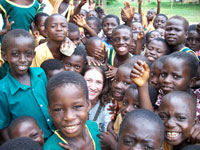
By Hannah Locke and Glenn Judah
The old slave castles along the coast of Ghana, Africa, can hardly be considered an ideal tourist destination. Two feet up from the ground, a marker on the walls symbolized how high the slaves’ excrement got before the traders drained it. Above the female slave quarters, free men worshiped their God while snickering that the African women below were not good enough for God to love.
“The West thinks we are blessed by God, but in some sense we stole much of what we created from Africa,” said Marilyn de Guehery, a Flagler student whose passion for helping and spirituality took her on an amazing journey this summer.
While most students spend their summer vacations working and relaxing, de Guehery left behind her modern comforts and traveled to Africa with Flagler’s Intervarsity club. She went to Ghana for six weeks where she taught religion and English, and helped out in the community.
“I observed how spirituality and religion filters into every aspect of life,” de Guehery said. “In America, religion is its own entity, and it’s rude if not illegal to place it where it does not belong.”
She saw the opposite of this in Africa. De Guehery saw how capitalism and religion were being used together in Ghana.
“What caused me dissonance was when I saw elements of western society that had been brought to Ghana and then spiritualized,” she said. “Seeing taxi cabs compete with the huge phrases they would place in their rear windows. Would you like to ride in the ‘God Will Provide’ taxi?”
Her trip was a life changing experience.
“My time in Ghana this summer was a time during which I learned so much about myself, my world, and my God,” de Guehery said.
While in Ghana, de Guehery experienced life as an African. She lived in the small village of Wamaso in mud-brick huts with no electricity, no running water and no modern conveniences. She doesn’t feel this style of life is one of poverty.
“When I came to Africa I had expectations of poverty, hunger, and war, de Guehery said. “That wasn’t what I found in Ghana.”
De Guehery saw it as a life of simplicity.
“The people in the village I lived in are mostly dependent on themselves,” de Guehery said. “They grow their own food, make their own goods and barter for things they need.”
On her final week of her trip she traveled to the coast of Ghana to visit the slave castles. The slave castles shaped the way she views the world, specifically Africa, Europe and the U.S.
“I had been working a lot over the past year and a half advocating for the victims of the civil war in Sudan, but I saw parts of Africa in a new light at the slave castles,” de Guehery said.
It opened her mind to the thought of what Africa would be like today with out the Atlantic Slave trade or colonialism.
“What if they weren’t given guns as payment for the slaves?” de Guehery asked. “In this light, it should be unimaginable to see bloody civil wars as inevitable characteristic of Africa today and not see the part Europe and America played in that, and now how we reap every benefit of it.”
The most difficult image of the slave castles for de Guehery were the chapels for European officials that had been built on top of the slave dungeons. The dungeons held the slaves where they were treated like less than animals.
“It brings tears to my eyes to marvel at how real the Gospel is that Africans, in the midst of all the evil and destructive things the whites brought, were able to pluck out Jesus and say, ‘I still want him,’ ” de Guehery said.
De Guehery, now back at Flagler says her trip to Africa has changed her for good. She says her experience gave her a new appreciation for African descendants living in the U.S. She speaks with passion about the great strength the ancestors of today’s African-Americans must have had to make a 150-mile trek to the slave castles and then endure months on a ship to the Americas only to be sold into slavery.
“I have a broader view of Africa and greater passion to see the peace and prosperity that the kingdom of God has for that continent become manifest,” she said.


Be the first to comment on "Summer spent helping in Ghana"